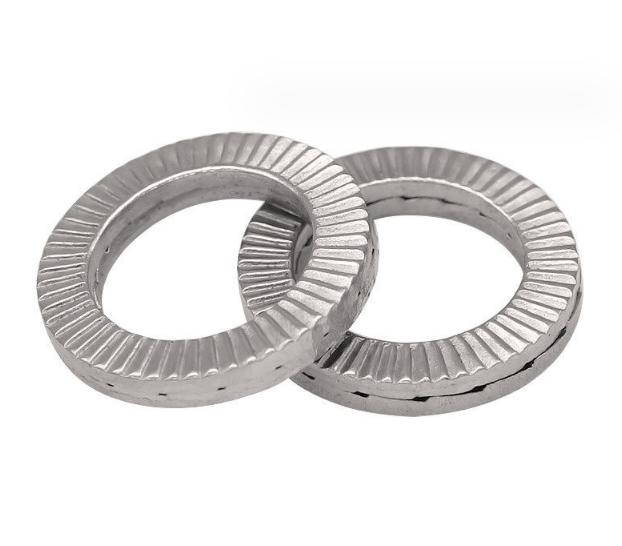When to Use Spring Washers: A Comprehensive Guide
Spring washers, also known as disc springs, are a basic yet effective type of washer that is widely utilized in mechanical and industrial applications. These one-of-a-kind washers have a special shape and function that makes them useful in various situations. In this article, we focus on when to use spring washers, exploring what spring washers are, their commonly used types, situations where they are used, and useful tips for using spring washers effectively.

Understanding Spring Washers
Spring washers are washers distinguished by their spring-like form. They are normally made of steel, stainless steel, or polymers, and can be utilized in a variety of forms and sizes depending on the application. These washers are intended to give various benefits, most notably the ability to retain tension and prevent fasteners from loosening owing to vibration or other stresses.
Common Used Types of Spring Washers

Belleville Washers
Belleville washers are spring washers that have a cone form and exert a spring force when compressed. They are commonly used to maintain preload in bolted connections, making them resistant to vibration and shock.
Wave Washers
Wave washers, as the name suggests, have a wavy or serrated profile. They are suitable for applications where moderate spring force is required and are often used as cushioning devices.
Split Lock Washers
Split lock washers are a form of spring washer that has a split or cut in the center. They are used to prevent vibration loosening but are less effective than other spring washer varieties.
Curved Washers
Curved washers have a curved shape and are appropriate for applications that require a constant spring force, such as electrical connections or antennas.

Key Situations Where Spring Washers are Used
Vibration Resistance
Spring washers are especially beneficial in applications where fasteners can loosen over time due to vibration. The Belleville washer, with its high spring rate, is very useful in such situations. Heavy machinery, car suspension systems, and aviation components are a few examples.
Preload Maintenance
Spring washers can be used to keep fasteners at a certain preload. This is crucial in applications where maintaining a consistent clamping force is essential, such as in engines, where the head bolts must remain at a specific torque to prevent leaks.
Thermal Expansion
Spring washers can compensate for thermal expansion and contraction in materials. When temperature fluctuations may cause a loss of clamping force, spring washers can help maintain the required tension, making them valuable in boiler systems, exhaust components, and industrial ovens.
Electrical Contacts
In electrical applications, curved washers are used to ensure consistent electrical contact and prevent loose connections, which can lead to voltage drops and other issues.
Axial and Radial Space Constraints
Because of its tiny shape, spring washers can be employed in tight areas where conventional washers are unfeasible. They provide effective tension maintenance in tight spaces.
Locking Mechanisms
Although split lock washers are commonly employed in locking mechanisms, other locking devices such as lock nuts and thread-locking adhesives may be more effective in many circumstances.

Tips and Considerations for Using Spring Washers Effectively
Using spring washers effectively is crucial to ensure the reliability and longevity of mechanical assemblies.
Select the Right Type
Different types of spring washers are designed for specific applications. Consider your assembly’s needs and select the right type, such as Belleville washers for strong spring force, wave washers for cushioning, and curved washers for electrical contacts.
Proper Sizing
Ascertain that the spring washer’s inner and outer diameters are appropriate for the fastener and application. A washer that is too small may not produce the appropriate tension.
Material Selection
Choose the material of the spring washer carefully. Materials like stainless steel and carbon steel are common choices. Consider factors like corrosion resistance and environmental conditions when selecting the material.
Correct Orientation
Pay attention to the orientation of the spring washer. Belleville washers, for example, should be installed with the convex side facing the nut or bolt head to achieve the intended spring force.
Tightening Torque
Follow the manufacturer’s tightening torque recommendations for the fastener. Spring washer performance can be harmed by under- or over-tightening. The washers are loaded within their elastic range if the torque is applied correctly.
Use in Pairs
In some applications, it may be necessary to use spring washers in pairs to achieve the desired preload and vibration resistance. Be sure to follow the manufacturer’s recommendations.
Avoid Overloading
The deflection range of spring washers is restricted. Overloading the washers can result in irreversible deformation or failure. Consider utilizing more washers if a stronger spring force is required.
Inspect for Damage
Inspect the spring washers for evidence of breakage, distortion, or corrosion before installation. Damaged washers should be avoided because they may not supply the necessary tension.
Consider Alternatives
While spring washers are effective in many situations, consider alternative locking and tension-maintaining methods, such as lock nuts, thread-locking adhesives, or Belleville washers in combination with flat washers, depending on the specific needs of your assembly.
Conclusion
With their distinct designs and properties, spring washers are an invaluable addition to the toolkits of engineers, mechanics, and anybody else who works with fasteners. They are especially effective for dealing with vibration, thermal expansion, preload maintenance, and space limits. Choosing the right type of spring washer for a certain application is critical for getting the required outcomes and maintaining the assembly’s lifetime and safety. Spring washers, when utilized appropriately, can considerably improve the dependability and performance of mechanical systems.








